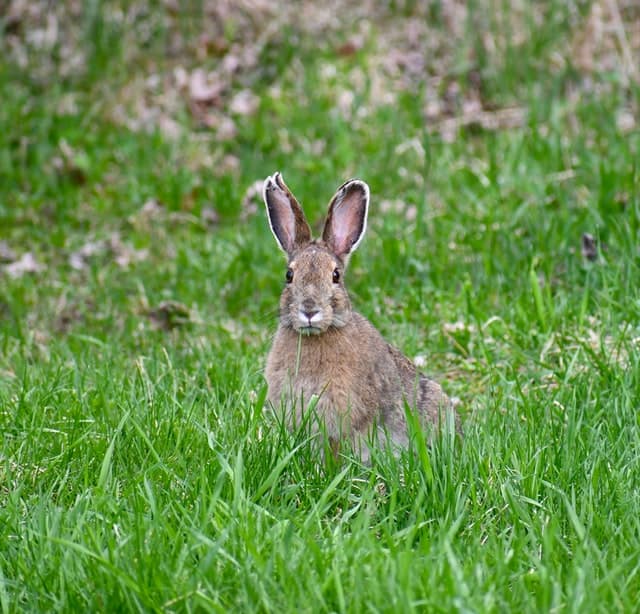
Do you have a rabbit at home? In this article, we will list all the symptoms of a sick rabbit, which will help us prevent big problems if we act quickly.
9 Symptoms of a sick rabbit
The moment a rabbit presents any disease, we will know it immediately, since we will see how our pet changes practically its entire routine. Here are some signs and symptoms of a sick rabbit:
Inapetence :
When a rabbit loses interest in food, we need to worry. It may be temporary, but if this condition remains throughout the day, we must quickly go to the vet.
Diarrhea :
It can appear for different causes, generally bacterial or parasitic. It is associated with digestive diseases and if the cause is not sought in time, it can be fatal.
Weightloss:
Weight loss is quite dangerous in rabbits and can be associated with almost any pathology. We must be careful that your bunny always eats correctly and is gaining weight in the correct way.
Difficulty eating :
The rabbit looks for food, but there is obvious difficulty in chewing or swallowing. This symptom may be due among other things to the abnormal growth of the rabbit’s teeth.
Red or irritated eyes:
Rabbits that do not receive proper management from their owner and this does not provide the ideal environmental conditions for their life, can develop eye diseases, such as conjunctivitis.
Ataxia :
It refers to the decreased ability to control movements. It is associated with nervous problems and in rabbits it is very common in vestibular syndrome and internal otitis.
Abnormal head tilt:
It is a clear sign of otitis or vestibular syndrome, and it is usually very characteristic at the time of diagnosis.
Loss of hair:
Alopecia is a clear sign that something is wrong, and veterinary attention should be as soon as possible.
Coughing and sneezing:
In rabbits, respiratory diseases are also usually disastrous and it is appropriate to treat them in time.
We recommend the maximum attention to your bunny and the due visits to the veterinarian on a continuous basis.
Rabbit diseases and their symptoms
Heatstroke:
This occurs when it is exposed to inappropriate temperatures for its species. Rabbits at temperatures equal to or greater than 30 ° C can experience heat stroke. This problem manifests itself with symptoms such as fatigue, red ears, shortness of breath, and can lead to serious heart problems. Rabbits require a cool habitat.
Rage :
This pathology attacks the nervous system, it is viral, it is transmitted by the bite or scratch of a sick animal. Among the symptoms are abundant salivation, as well as signs of dehydration and an alteration in mood. When the virus enters the body, reaches the brain and spreads through all organs, it is very deadly if it is not treated in time. To combat and prevent it, it is best to apply the corresponding vaccination.
Viral hemorrhage :
It is a highly infectious and contagious disease. This causes bleeding in the nostrils, fever, respiratory distress and seizures. If not treated in time, it can cause death.
Myxomatosis :
It is transmitted by the bite of insects that feed on the blood (fleas, ticks, flies, mosquitoes and lice). The symptoms it produces is inflammation of the eyelids, lips, breasts, ears, genitals and the nasal passages. It also produces secretions in the mucous membranes. The symptoms do not appear immediately with the contagion, but within days. In addition, there is no cure and they usually die after a few weeks of being infected. For this reason it is necessary to prevent by placing the corresponding vaccine.
Cold:
This is one of the most common pathologies, it is caused by inadequate humidity conditions. The symptoms it presents are: sneezing, irritation of the mucous membranes, secretions, loss of appetite and apathy.
Pneumonia:
It is spread when a bacterium of pneumococcal origin enters the body, reaching the lungs. The symptoms are similar to those of a cold or pasterellosis, but it turns out to be a more serious infection. Shortness of breath, snoring, coughing, sneezing, and mucus occur.
Coccidiosis:
This intestinal infection occurs when the rabbit consumes food with excrement of the coccidian bacteria. When it reaches the stomach and produces digestive disorders such as gas, uncontrollable diarrhea and dehydration. It is one of the leading cause of death in rabbits .
Obesity:
Produced by poor nutrition, which leads to overweight. This is the detonator of multiple pathologies associated with the motor, cardiac and digestive systems and can even lead to death. The best way to prevent it is by using a balanced diet.
Giardiasis:
Giardia are bacteria that lodge in the intestine causing diarrhea and dehydration. In addition to this, it produces abnormalities in the stool.
Hair balls:
These produce the intestinal obstruction that is evidenced by the low generation of stools, loss of appetite and weight.
Rabbit ringworm:
This annoyance in rabbits is caused by a fungus. It causes the coat to fall in specific areas such as the face. In that sense, it can be evidenced by small patches without hair and scabs all over the body.
Plantar corns :
It is also known as pododermatitis. Which occurs when rabbits have wounds on the pads of their feet and they become infected.
Scabies:
It can be given in two ways: on the skin and in the ears and ears. This is produced by mites that deposit their eggs on the rabbit’s skin. When these hatch they produce larvae that in turn generate scabs, itching and wounds on the skin.
Fleas and lice:
Itching, bad smell and bad appearance of the skin and coat are evidence of the possible presence of fleas and lice.
Taluremia:
Taluremia is transmitted by the bite of mites and insects such as fleas and lice. Among the symptoms it produces are ulcers on the skin and mouth, inflammation of the eyes. But the main symptom is the total loss of appetite.
Ear diseases:
The main symptom that shows this pathology in rabbits is the loss of balance and poor orientation of the head.
Abscesses:
They are infections, caused by bacteria that enter the body internally or externally. These show up as ulcers or bulging in parts of the body, with pain, swelling, and discharge from skin and blood.
Mastitis:
It is caused by the infection of streptococci and staph bacteria. Which produce fever, swelling and a change in appearance in the sick rabbit’s breasts.
These are the main symptoms of a sick rabbit, take your exotic animal vet immediately, if you notice any of them.






